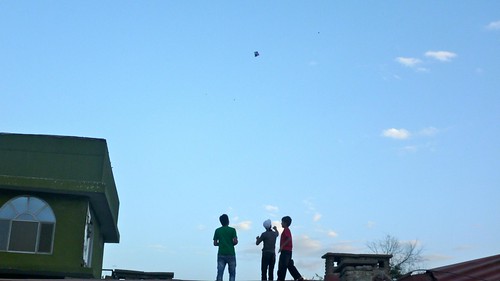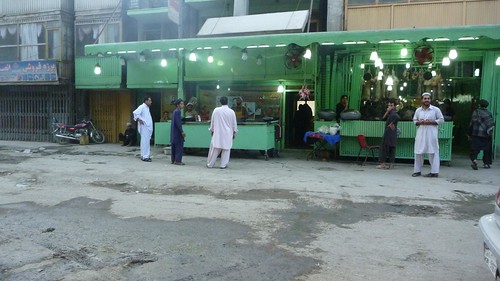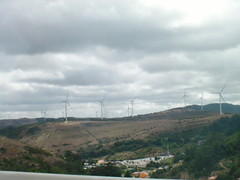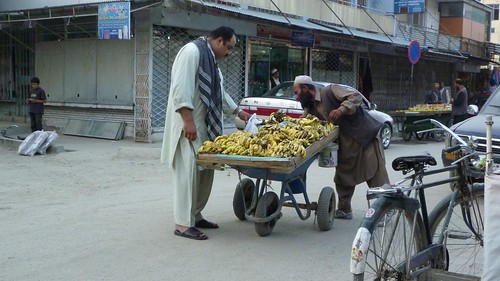As hard as it has been to record a video entry from Afghanistan, I’m finally getting the hang of when is a good moment. The following video entry was recorded from a friend’s balcony on the first day of Eid. Just a little video hello, one week before the much anticipated Afghan Parliamentary Elections.
Author Archives: bicyclemark
Kites of Kabul

I turn left into an alleyway which is narrow and somewhat foul smelling from the open sewer, like many alleys in Kabul. I’m thinking of what tasks still need to be done today and wondering how late I am for my next appointment, when suddenly a group of kids will run right passed me. They seem to be chasing something, looking up at the sky as they run and calling to someone nearby even though I can’t see another person over the tall walls which frame these alleyways. I suddenly realize they’re following kites, as I raise my face to the sky to see the scores of little specks in the sky. I stop walking, taking note if anyone is coming who might notice my foreign-ness, and I stare at the dancing kites in the sky with a big smile on my face.
Hours later I’m back at my residence and I decide to go on the roof to see what I can see. It is the last day of Eid, the very important holiday in the Muslim faith, and as one would expect on a holiday, from high above the city sounded calm. Yet on every rooftop including my own, groups of children are huddled together unravelling spools, squinting at the sky, and mending wounded kites. Those that aren’t working on something kite related are doing something with their own rooftop pigeons.
I notice the ladder leading up to another rooftop area, higher up then this one, where more kids are flying kites. As a matter of fact I notice many ladders, the primary means for kids to run from rooftop to rooftop, all in the name of kites. I give a warm nod to each of the kids, who seem surprised to see me at first, and then completely used to my presence. Even stopping to pose for a picture since they notice I’m using my little compact camera. I climb up next to them. Now, to the casual observer, I might even be in the kite flying business myself, standing next to one taller boy who seems to be running two kites that are flying higher those almost anyone can see. He motions with his hands and adjusts the spool with lightening agility, looking more like a master puppeteer than a kid with a kite. As the afternoon comes to a close and the sun passes almost behind the mountains that surround Kabul, the hundreds of kites that cover the sky like birds in formation start to disappear. My own rooftop colleagues grab the spools and cut the lines, making me wonder where their kites end up. They make for the ladders without looking at me. Just when I feel completely invisible, on my way down the ladder I can feel someone holding it steady for me. “Thank you” I say to the one of the boys in Dari and English, “You are welcome” he responds in his best english. By the time I’ve reached the bottom of the ladder, he and the kite kids have vanished, for what I can only imagine is dinner time. The end of another day filled with paper, tape, and string, another day of ruling the skies.
As I sit back down at my desk with fresh images of kite flying in my head, I get a message from a friend asking what meaning Sept. 11th has for people in Kabul. I have no big answer for such a question, all I can think of is what a great day it was to fly a kite.
Upside of Afghan Elections
Cross-posted on Americablog.com:
There is a term that is often thrown around in reference to how elections, in any nation around the world, should ideally be conducted: “free and fair”. When much of the world is watching an election and trying to gage if it is a good election, we look for evidence that people were able to vote without intimidation or any other undemocratic obstacle, and that the results of the vote were processed without irregularities. If this does not happen, then the reports start coming in, and we all sort of collectively decide that whatever elections a nation claims to have had, they were not up to the “free and fair” standard and therefore are not really a democracy.
Here in Afghanistan elections are only 2 weeks away. It is no secret that the government does not control the entire country and a war continues to be waged. Last month the announcement came that due to the strong risk of fraud and violence in certain regions, 900 polling stations would remain closed on election day. In a city like Kabul, Afghan National Police (ANP) run checkpoints throughout the city and there is the undertone of fear of being attacked or kidnapped by both foreign and local people. All-in-all, the task of holding an election in two weeks time is obviously going to be difficult and not without some problems.
The conclusion many observers in the media, governments, and perhaps you reading this right now, is that based on the aforementioned problems, the election is a failure before it even takes place. They take the standard of “free and fair” and they look at the poll closings, the threat of violence, and the recent attacks on political candidates, and they say – nope, Afghanistan’s election is a failure.
Yet the situation could also be looked at in another way. We could look at the 19,942 other polling stations that will be opened and look at the examples where people are voting when election day comes. We can look at the long list of 2,556 candidates from diverse backgrounds, including 405 women, running for parliament. Because looking at election with an interest in what goes right, not only what goes wrong, should also be part of the story that is Afghanistan today.
“Free and Fair” is certainly something anyone would want in an election, and if we were honest, we would admit that this doesn’t exist anywhere in the world. In the end we aim for an election that is as free and fair as possible within its context. The Afghan context is no doubt one of the most difficult in the world right now, but to be able to carry out an election, even one wrought with problems, should also be worth something on the road to stability.
Nightfall in Kabul
This stretch of road, like so many in this city, is almost completely dark at night. No street light, no lights from houses (most of them are in ruins) and at this hour of night, no car headlights either. One block down we can see the fancy supermarket which is conveniently open until midnight, always featuring an array of SUV’s of foreign contractors out front, and guarded by about 4 men in khaki fatigues wielding AK-47’s.
As I choose each step carefully to make sure I don’t step in a hole or an open gutter, I suddenly notice a steady noise in the darkness across the street. It is the sound of a shovel and as my eyes adjust to the lack of light, I notice this person is working on the road. I scan the darkness and notice 2 or 3 more figures carrying tools and doing some kind of work on the road that looks like it might be paved in the next 24 hours. These men work late at night in the dark…. I’m impressed they can see what they are doing.
Kabul is, for obvious reasons, not known for its night life and evening strolls. But if you do dare take one you can watch the pomegranate stand guy close up his stand for the night. You can watch the bread store sweep up and take the last bread out of the window. You can experience the groups of Afghan police attempting to communicate with you or talk about you in semi-English as you pass their roadblocks. And just when I thought no one else was out on the street, a gang of 5 children on rickety bicycles rolls by, just barely noticing me while negotiating the gigantic potholes in the road.
An Afghan friend, knowing that I’m new in town, takes us on a long drive around town… among the landmarks we see, the drab yet fascinating neighborhood built in the Soviet era, the incredibly fortified American military base that looks like something dreamed up in hollywood, and the most spectacular site of the night -the wedding centers- which look like Las Vegas casinos with extra christmas lights wrapped around them. Shining commercial temples against the backdrop of a town that goes quite dark and bleak at night. No matter which direction the car turns, way up ahead in any direction are the mountains. Even at this hour, still towering over us with pockets of small white lights.
Kabul during the day is infamous for its chaos, a chaos that is often frustrating, but when you least expect it, a chaos that can somehow make you laugh or learn to let go and just let the city do what it needs to do.

Dubai Warm Up
No time to explain. Almost no time to pack. So let’s not waste anymore of what is already so precious.
My arrival in Dubai was in the dark which is perhaps a good thing for someone who thought he understood what hot weather was. Even late at night, everyone is kind, helpful, and I can’t help but notice way too many doormen, desk people, greeter, general I-don’t-know-what-person. All these people work here?
Fast-forward, 8h30am and I’ve arrived at the Afghanistan consulate early, since getting the Visa today is pretty much the key to this entire journey. Naturally its around back that people sit around a plastic table and chairs next to an air-conditioner using every bit of its mechanical strength to provide a touch of less than steamy air. I walk in, scan the room, nod my head towards everyone, and take a seat.
As I steal glances at the faces around me, 2 things strike me:
1- The are all wearing (except for one gentleman who is likely reading this text) the comfy looking white pajama like clothing which I think is typical in desert nations.
2- With my beard now at a good level of thickness, and a lightly tanned face, some of these guys look like me! Or is it that I hope to look like them, in order to one day fit in once I get there?

An hour later the men in pajamas are almost all gone, replaced by western looking contractor types. Irish, Canadian, American, South African, Japanese…many are polite and friendly, both to me and when they speak with staff. Others seem in a rush or wanting to have things their way in a situation where I seriously doubt you can dictate terms. I listen to an older grey haired woman chat in Afrikaans with a white bearded gentlemen who just arrived. Only one day since leaving the Netherlands but I get a little thrill to hear a variation on Dutch. They discuss how many times they’ve now been through this process.
I stop listening. Too much to soak in if I’m going to start listening to every conversation. Eventually after a long wait, a strange window opens and people look towards myself and another gentleman who arrived first. He lives in Afghanistan for some years now. I start to find some strange comfort from meeting a few polite and upbeat westerners who are eager to get back to Kabul and relaxed about the Visa process. Not that being un-relaxed would help any.
Hours later my visa is ready. My plane ticket to Kabul is booked. I have a few hours and one short night in Dubai. The temperature is something cruel far above 100F /40C. It is Ramadan so it feels impossible to find an open restaurant (i think its illegal?). I want to give up and sleep in the comfy bed til it is time to fly, but then I hear the voices and I see the messages on facebook… go explore.. go see what this Dubai has to show you in the limited time you have. Come morning, being a tourist is no longer a safe idea, and there is work to be done.
Portugal’s Alternative Energy Revolution

It isn’t hard to find things that don’t work correctly in Portugal. It also isn’t hard to find people who will go on and on about how the prime minister is a bum and a crook. Indeed Portugal has plenty of problems as a nation with high unemployment, a disappearing rural population, and unsustainable metropolitan centers.
So it may come as a surprise after all this, to learn that Portugal is a global leader in alternative energy. More specifically, as of this year the country gets 45% of its total energy from renewable resources like wind, solar, wave and hydro. Besides being an impressive number it is even more eye opening when you learn that this is a 28% increase from 5 years ago. And just when you thought you’d already been impressed, you will find that -in fact- Portugal has become one of the largest (if not THE largest) wind energy producers in the United States!
How did this happen? What conditions and factors somehow led to this fairly small and less wealthy European nation become so active in alternative energy? Here are a few reasons:
Despite a very low approval rating now, when his party was elected with a parliamentary majority in 2005, Prime Minister José Socrates and his cabinet set their sites on major investments in renewable energy, even under huge warnings that it would cost too much money. 5 years, many landmark projects, and 13.6 billion euros later, Portugal has developed energy production and a smart grid that most of the world only talks about having one day. The nation is now in a position to decommission 2 coal power plants and even sold energy to Spain this year. In the next few years they will roll out the world’s first nation wide electric car and charging station network. They also expect their percentage of electricity produced by renewable sources to be 60% by 2020.
Sure there are questions and a whole lot of concerns about what has happened in Portugal. The biggest being the high price of electricity in the country. Or what will happen if private investors and private energy companies get into financial problems, will the windmills, solar panels, tidal machines, and hydro-electric power plants still be run and maintained?
In the short term people may look at their energy bills and feel like they have been wronged. The government may be accused or in fact involved in some scandal eventually resulting in it being voted out of office. The achievements of Portugal may always be overshadowed by large nations like the US and China being unwilling and unable to take bold steps towards an efficient and environmentally sustainable energy system. Yet despite all the criticism that has come and may come one day, especially in the political and economic realm, Portugal has accomplished an amazing feat in the quest to reduce emissions and dependence on fossil fuels.
